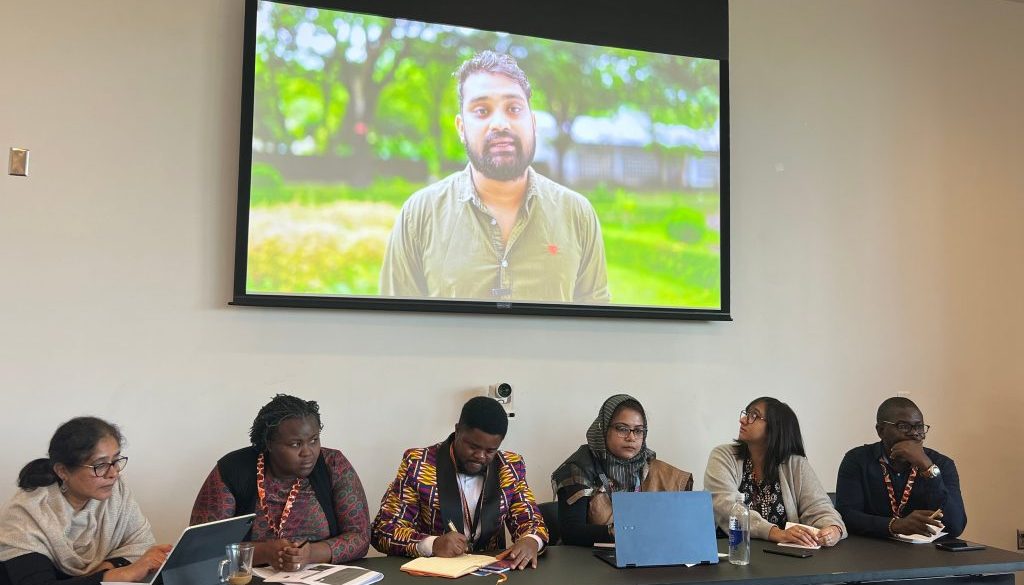Intersectionality and urban health – What we heard at ICUH
Earlier this month colleagues from across the consortium attended the International Conference on Urban Health in Atlanta, USA. The team pulled together a fascinating panel presentation that looked at intersectional analyses from across the ARISE consortium. The panel consisted of colleagues from across the consortium, and our four focus countries and was well attended by delegates from across the world.
The panel was chaired by Dr Surekha Garimella of The George Institute for Global Health, India. Surekha started the session by outlining how globally, more than half of all people live in urban areas and 60% are projected to do so by 2050. She explained that one in three urban dwellers now live in precarious, marginalised areas, including informal spaces; an estimated 881 million people in low- and middle-income countries. She also spoke about how the nature of informality and the unequal power relations present in society deny people their human rights and entitlements and result in structural violence.
Surekha said, “Within ARISE we want to focus on tackling the social and political systems that shape these issues, ultimately addressing issues of structural violence.” She explained how one of the consortium’s core principles is using an intersectional approach to understanding health and wellbeing, moving beyond the single axis framework that is dominant and drawing inspiration from African American colleagues and activists that developed this approach.
Surekha went on to explain how people are shaped by their simultaneous membership of communities and the interaction between these interactions and connected systems of power. That power manifests in many ways and actions, and recognition of the inequality of power is central to our understanding of intersectionality. Throughout the presentations from colleagues we shared examples of multiple forms of vulnerability and how we make sense of it all.
ARISE ICUH Intersectional Analyses panel 2023 Surekha Garimella
As a consortium, we really wanted to make sure we brought the voices of the communities we work in, and the co-researchers we work with, to international gatherings such as ICUH. Surekha’s introduction was followed by videos from co researchers in Bangladesh, Kenya, and India, sharing their experiences and telling their stories. We heard from Miriam Abwanda, a deaf woman living in Kenya; Sanjoy Kumar Sanz, a male co-researcher working with us in Bangladesh; and Rupa Khatri, a female waste worker in Shimla, India.
Samuel Saidu from COMAHS, Sierra Leone talked about his PhD research around the health seeking behaviours of young people living in informal settlements in Freetown. He also centred the voices of his co researchers and community members. A young man from Moyiba, discussing how he would define health and wellbeing said, “I think [a young boy’s] health is defined as the state in which I can care for myself when I am sick and when I have no diseases or bacteria affecting my body.” While a young woman from Cockle Bay said, “Wellbeing is when I can do everything myself especially when I am not struggling to pay school fees or what I should eat for the day. I can do everything for myself without getting others involved with my burden.”
ARISE ICUH Intersectional Analyses panel Samuel Saidu
Inayat Singh Kakar of The George Institute then spoke about the experiences of women waste workers in Shimla, India. She explained how, despite women making up the majority of the door-to-door waste workforce, decisions on demands and strategy are largely taken by men, with issues specific to women often missing from the demands of the collective. Inayat spoke about how ARISE worked to create spaces where women could lead, through consistent dialogue between women workers and researchers and exposure visits and interactions with collectives led by women.
ARISE ICUH Intersectional Analyses panel Inayat Singh
We then heard from Kenyan colleagues, with Linet Okoth presenting on behalf of her LVCT health colleagues Inviolata Njoroge and Robinson Karuga. The presentation focused on the experiences of people with disabilities (PWDs). Linet explained that approximately 5% of Kenyans are PWDs, that health inequities arise from unfair conditions faced by persons with disabilities, and health access for PWDs is even more constrained due to limited resources. The experiences of PWDs were further explored through the community based participatory research approach Photovoice.
ARISE ICUH Intersectional Analyses panel Inviolata Njoroge
Next, we heard from Bachera Aktar from the BRAC James P Grant School of Public Health at BRAC University in Bangladesh. Her presentation focused on the intersectional gender analysis of factors influencing access to healthcare among women living in informal urban settlements undertaken by ARISE. Bachera spoke through the methodology and key findings, as well as the intersectional factors influencing women’s access to healthcare, weaving in the voices of respondents.
A community researcher in Kollyanpur said, “Many girls in our area suffer from genital infections and menstruation-related problems but are hesitant to discuss with their parents, and cannot also seek treatment because of embarrassment. As a result, those minor problems gradually become major health risks over time.”
ARISE Intersectional Analysis presentation ICUH Bachera Aktar
Finally we heard from Abu Conteh from Sierra Leone Urban Research Centre on his PhD research looking at how infectious disease and non-communicable diseases (NCDs) impacting the poor, particularly in fragile settings. Abu also discussed the impact of COVID-19 in areas already under pressure, and how health outcomes are already precarious in informal settlements; influenced by intersecting inequities.
ARISE ICUH Intersectional Analyses Abu Conteh
We are so glad to have had the opportunity to share our work with an international audience, and have been able to centre the voices and experiences of our co researchers and communities and highlight the importance of an intersectional analysis of inequity and marginalisation.
